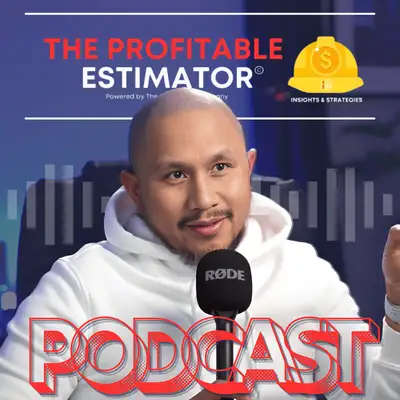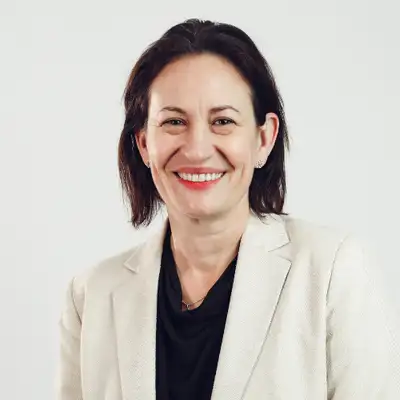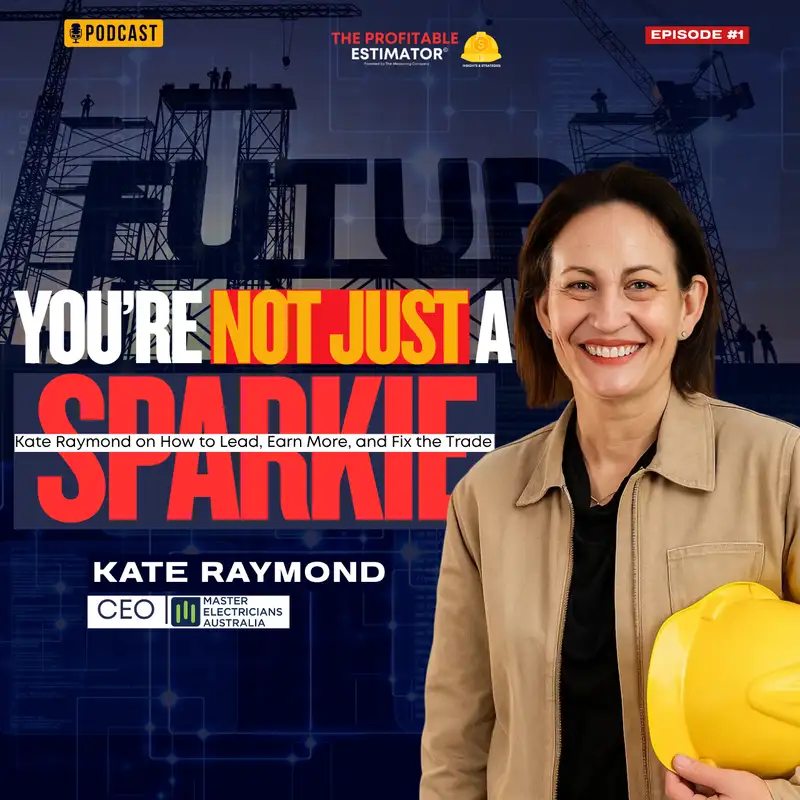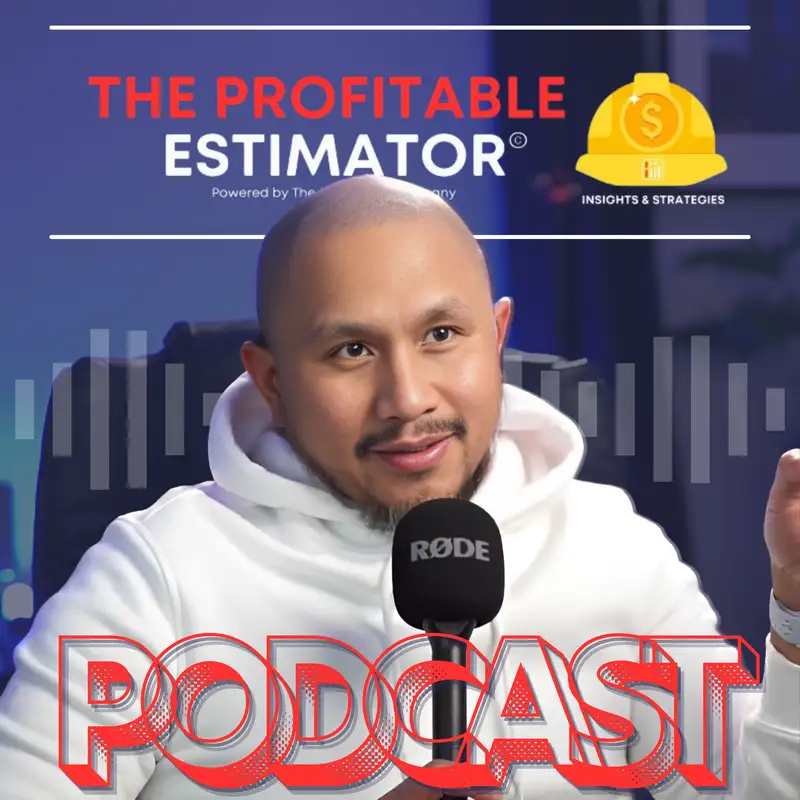You're Not Just A Sparkie — Kate Raymond on How to Lead, Earn More, and Fix the Trade
Good day, legends. You're tuned in to the Profitable Estimator, the show where we turn takeoffs into takehome pay. I'm Joey Hidalgo, the founder of the Messoring Company. Your mate behind the mic. Around here, we talk real numbers, real projects, real profit minus the fluff.
Joey Hidalgo:Whether you're sparky quoting switchboards, a chippie framing townhouses, or a builder wrangling the whole circus, this podcast is your cheat sheet to sharper estimates, smarter procurement, and stress free cash flow. Each week, I'll pull in the industry heavyweights on the tools, tradies and data nerds to unpack tactics you gain action today. Plus a few more stories, so you know you're not alone out there. Ready to measure what matters? Get paid what you're worth.
Joey Hidalgo:Let's crack on.
Kate Raymond:You know, people would assume that I was a secretary when I would, you know, call someone whether even when I worked in public works, speaking to builders and things. They just kind of assumed that you were, you know, the office admin. Or when I was a lawyer, people often assume you're the secretary or yeah. It's a real it's a real assumption that, oh, you're a woman, so you're probably typing a memo. And I'm not not referring to my current role specifically, but in roles throughout, you know, there's a real assumption that the woman, regardless of seniority, that it's the woman who will kinda set up the food and drinks and clean up afterwards and take the minutes and, you know, do all the kinda little things, organize it, do all the organizational stuff.
Kate Raymond:So it's it's yeah. Those biases, they're still really there.
Joey Hidalgo:Today's guest Kate Raymond took the reins of the Master Electricians in April 2024 after a career spanning twenty five years across construction law, public sector regulation and senior advocacy roles with Master Builders Queensland and the Australian Constructors Association. In short, she knows the policy levers and the job site realities that shape your margins. Kate, before we dive into skills policy, give us a sixty second origin story. How does a construction lawyer end up steering one of the country's biggest trade associations?
Kate Raymond:Yeah. Okay. So I kinda landed in this role, you know, almost accidentally and and in this sector accidentally. Most people kind of end up in construction. Well, not most people, but a lot of people end up in construction accidentally, particularly when they come from the legal background, which is which was my path.
Kate Raymond:So, not too many people are in high school thinking I wanna be a construction lawyer. It's just not not a thing. And that's kinda what happened to me. So fell into law and then and then fell into construction law with, just happened to be involved in a in a court case with the firm I was working with that concerned construction, and it was great fun. I really enjoyed it, and the team asked me to join them.
Kate Raymond:So working in construction, I just really loved it. And I I didn't really love private law, so I moved quickly out into the Department of Public Works in Queensland. And they, at the time, had this awesome, unit around, you know, legal and contracts working on, all of the projects all of the building projects in Queensland, but particularly the big projects. So it was a really exciting time, working on on all the hospitals and schools and prisons and art galleries and, everything a bridge, you know, all those sort of big projects that were coming online at that time. And it was exciting and and fascinating and, you know, just loved it.
Kate Raymond:My husband is also in construction. He's a QS by background. So so we kinda have that at at home as well, and he's he's still in the in the sector. So, yeah, to cut a long story kinda short because the career has taken a few twists and turns, I found myself at the building regulator in Queensland, being an assistant commissioner, in the regulatory arm, which I real you know, it's weird to say I enjoyed it, but I did enjoy it. It was a really interesting time, but it was a really challenging role as well.
Kate Raymond:And so moving from there into association land, starting with the ACA and then master builders and then into master electricians has been wonderful because when you're in a when you're in a regulator, someone always hates you. You know? You you're either either the the licensee or the person complaining, someone hates you. So when you work for an association, it's really positive and lovely because you get to everything we do is about how can we improve the lives of our members? How can we make things better for the industry?
Kate Raymond:We're here for we're here for the industry, and we're here for the membership. So it's such a, it's such a positive role to have.
Joey Hidalgo:We keep hearing cut migration to fix housing. But without skilled Sparkies, nothing gets built. What does targeted migration actually look like in practice?
Kate Raymond:Yeah. It's really interesting. So we've we've got a workforce shortage. We've also got a housing shortage. So there's there's one side that says, well, look.
Kate Raymond:We need to, you know, reduce migration because we've got, a problem with not enough housing for people who are here. And if we bring people in, where do we where do we house them? But if we don't bring the skills in to build what needs to be built, we also can't build what we need to build. So it's this this catch 22 where you have to really have targeted you need targeted migration to to fill the skills that are essential to get the the really urgent stuff done.
Joey Hidalgo:You've spoken about female apprentices still hunting for a clean loo on smaller jobs. What's one practical change crew leaders can make tomorrow that costs nothing but moves the dial in on inclusion?
Kate Raymond:Yeah. Yeah. Look. We still hear stories. So I, you know, I I want to hear from tradies out there and business owners out there, you know, what are you experiencing?
Kate Raymond:How what are the pain points? What are the, you know, the biases that we still see? And they're they are they are still there subconsciously mostly. So a lot of younger women in the sector still have those stories about, the disadvantage that they face. So female apprentices on smaller sites, you know, they they won't have toilet facilities for them.
Kate Raymond:So bay little things. So on bigger sites, they will be there, and and we've got new rules in some jurisdictions around that. But on smaller sites, they won't be. And the ramifications of that are just practical things like I if you're my supervisor and I'm an apprentice, I have to go and talk to you every time I need to go to the toilet because I need to go, you know, find the local Maccas or whatever it is to go to the toilet. So there's that extra bit of, you know, uncomfortableness in a way that, you know, not necessarily that I have to go to toilet, but that you're gonna then be aware what time I left, what time I came back.
Kate Raymond:You're like, there's a bit of a feeling of awkwardness around that for some people, and it's just another it's an extra barrier, I think, that does exist. Or quite commonly, really well meaning people who will say, oh, no. You can't carry that, or you don't lift that, or or no. That's that's too much for you because you're a you're a woman. And I think well, not always.
Kate Raymond:There's a lot of really strong women out there, like, you know, physically strong women out there. So then there's men out there who who have, you know, perhaps not visible disabilities or certain, you know, issues like a back problem, for example. So we shouldn't assume that. But, also, if it's too heavy for a woman to carry, then maybe it's actually too heavy for a man to carry as well if we look at work health safety. So let's innovate and let's use, you know, mechanical lifting devices because that's actually better for everyone.
Kate Raymond:So there's a lot of things that I think we're still to still to get over, and and a lot of women do say that they have trouble finding an apprenticeship sometimes, which is interesting because then I think there's other scenarios where probably people are desperately trying to find women to to, you know, meet, certain targets and things that they might have for their own business or perhaps as part of a, a government job they're doing where they've got gender targets and things. So it's, yeah, it's not an easy pathway, I don't think, for younger well, for for women because I think there's always a feeling of being in that minority, particularly on-site, being in a minority, and, sort of that feeling of other.
Joey Hidalgo:Estimators pour hours into bids that never proceed. From MEA's pirch, how can contractors protect themselves when a project stalls or dies?
Kate Raymond:So for me at the moment, I'm not working on live sort of projects, but I certainly have worked on projects before. And I and I've had to go through projects, not proceed. So when, you know, you spend a lot of work and effort on on the upfront, on all the paperwork and tenders and things like that, and and then having a project not go ahead after people have spent a lot of unpaid work, on projects. So when you when you prepare tender documents and go to tender and and you get those tenders in, The head contractor and all the subcontractors have done unpaid work to get those tenders in. And if the project doesn't even proceed, that's a kick for everyone, I think.
Kate Raymond:And it's hard, really hard.
Joey Hidalgo:A lot of first year electrical businesses under quote themselves out of existence. Was MEA's member, one tool or resource for getting charge out rates from day one?
Kate Raymond:Yeah. Yeah. Really interesting. So estimating a few different aspects. So in the in the bigger project space, I think we're seeing a lot of AI and and various tools being used and and great.
Kate Raymond:That's good. We should be incorporating, you know, we should be incorporating a lot of data and and automating that data and analysis of that data to assist with that estimating. On much at the much smaller end, I think, we see small businesses, particularly new businesses, who don't know how to estimate properly. They aren't taught how to do it, and so, you know, underpriced, don't actually factor in enough. And that's bad for everyone because experienced businesses miss out on jobs because they've priced it perhaps a bit more accurately and don't win a job.
Kate Raymond:And that new business really struggles because they're built they're, you know, building for free or working for free because there's no profit. So that's not fun. So it is something that we, as master electricians, want to educate industry on, and and we have some micro credentials and modules around around that, actually, specifically how to, you know, help help to know how to cost up a job.
Joey Hidalgo:AI takeoffs, free wire boards, bidirectional EV charges. What tech wave should small electrical firms ride now so they're not left padding behind in five years?
Kate Raymond:Yeah. Well, we're seeing, we're seeing things like, you know, prewired switchboards and and things like that kind of where we get a bit of increased productivity. So AI automation, new tech, the that's to me is about improving the productivity and doing more. It's not about, you know, that we're not gonna need workers because we we will, absolutely. It will hopefully improve productivity.
Kate Raymond:And we we wanna see small businesses understand how they can incorporate new tech into their business. Even things like, AI bot chatbots, telephone bots to be able to make, you know, data calls, things like that, to take that stress away from a business owner having to, you know, chase invoices. You can you can have an AI bot doing that, And that's a pretty cost effective way, and and they're they're getting better all the time. They're pretty responsive. People are starting to get used to them as well.
Kate Raymond:So I think there's a lot of opportunities to incorporate, you know, AI tech automation into business that you have to you have to have the time to do it, and that's where I think a lot of small businesses struggle. They struggle to find the time to actually implement the thing that'll make them more productive. But if they can do that, then they'll be so much more productive.
Joey Hidalgo:Some of our listeners use remote design staff in The Philippines to keep overheads lean. What due diligence boxes must they tick to an Aussie license park you can sign off with confidence?
Kate Raymond:Yeah. And that's where I think organizations like MEA really, become useful, or not the only place, but I think that's one particular place where organizations like us, you know, are there for that for that person wanting to go out on their own. So we have field support advisers who will go out, and they can attend, the member's business and chat to them about their compliance systems where we have compliance tools. We're currently developing an even better one that will come out, later this year, which is really cool. So compliance tools to help businesses actually do all of that stuff that needs to be done so they can do their bit and not worry about you know?
Kate Raymond:Well, not not worry, but make sure that it gets done and and feel confident that they're compliant because that's that's a real worry. You know, in electrical, particularly, compliance exists for safety. Licensing exists for safety. All the rules exist for safety because every day an electrician goes to work is is an opportunity for personal injury or worse, because electricity is dangerous, when you're exposed to it. So they are incredibly, you know, talented people who can work with, with electricity and do it safely.
Kate Raymond:So to be able to do all of that and run a business, it's so much. So whatever we can do to help with the compliance side of things, with, you know, to the business skills side of things, as well as, you know, technical skills and updates and tech advice on how far does this need to be away from this thing to be compliant. Yep. That's what we're there for. Ring us up.
Kate Raymond:You know, we've got a great team who will answer that call. We'll also help with all the safety stuff, so your swims and your, your risk assessments and all that compliance stuff that that is necessary to stay safe on the job, apprentice supervision, employing people, how to do all of that stuff. We've got people who will talk you through that. So we're really there as like a I always think like a silent business partner. My colleague refers to us as a Sherpa.
Kate Raymond:We're there we're there to help you up the mountain. We're not gonna climb it for you. You're gonna do the climbing, but we're there to guide and help.
Joey Hidalgo:Legendary Insights Kate. Where can listeners connect with you or tap into MEA's new business skill stream?
Kate Raymond:Yeah. Look. Thanks. Thank you for having me on, firstly. And I've enjoyed having this chat with you, and and we're on LinkedIn together, and and we quite often, you know, kinda check-in with each other, which is awesome, which and it's a nice community there.
Kate Raymond:So the thing that I have noticed about the construction industry is that it is a real community, and it has the capacity to be an even more connected community. And I really want to see that happen more and more because I think there's a lot of people in the industry who feel isolated, and then there's a lot of others who want to help and do more. So if we can try and connect each other up a little better, and whether that's through things like podcasts, which are actually an awesome medium to get information out there, through associations, through unions even, through, you know, lots of different methods to do that. But I think, you know, let let's all reach out and try and connect with each other a bit better in the sector.
Joey Hidalgo:If Kate Snuggets fired you up, share this episode with a main In A Trade and hit follow so you never miss a margin boosting tip. Show notes have links to MEA resources and our free costly checklist. Until next time, keep measuring what matters and keep building profitably.
Creators and Guests




